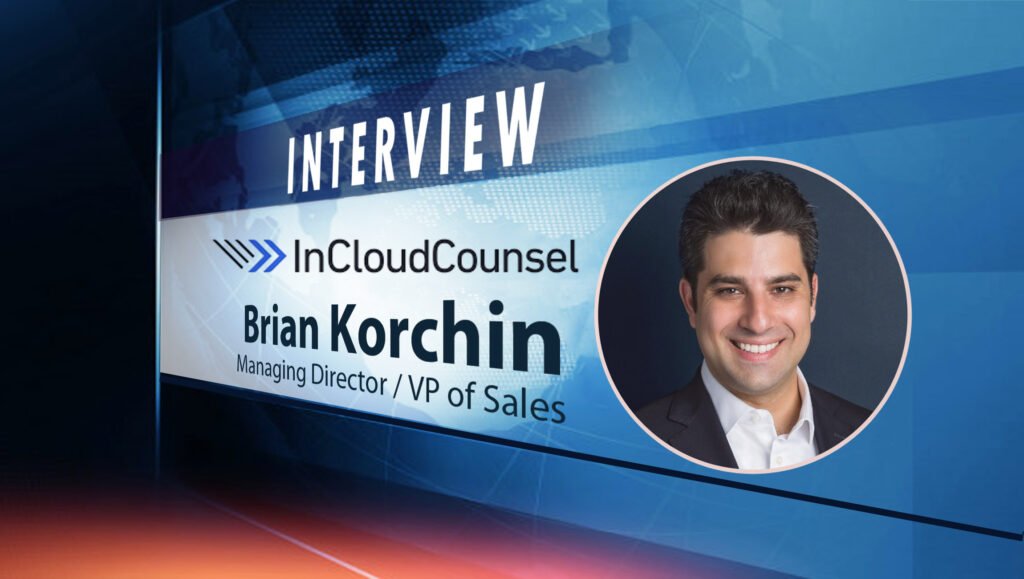Brian Korchin, Managing Director and VP of Sales at InCloudCounsel spent some time with SalesTechStar to share a few views on what it takes to enhance sales coaching and sales commission initiatives with the aim of optimizing a sales team’s overall processes and output: _____ I’m the VP of Sales at InCloudCounsel, where I lead the entire sales organization. We’re currently a team of 40 spread across North America, Europe, and Asia-Pacific. Similar to the rest of the company, our team continues to grow rapidly, and we’ll be close to 50 people by the end of the year. Before joining InCloudCounsel, I was a corporate lawyer for nearly 10 years. I started my legal career at Simpson Thacher & Bartlett, a large, NYC-based law firm, before moving to in-house roles at Jefferies, the investment bank, and Orchard Platform, venture-backed fintech company that was acquired by the online lender Kabbage. I live in the New York City area with my wife, Elizabeth, our two young sons, Micah and Asher, and our Boston Terrier, Nugget. Read More: SalesTechStar Interview with Jason Davis, Senior Director of Sales and Marketing Practice at BTS It’s definitely a challenging transition to go from seller to successful manager. However, I don’t think that challenge is unique to sales. In all functions of a company, moving from an individual contributor role to a managerial role is difficult because each of these roles requires a different set of skills to be successful. Sales leaders need to be thinking not only about how to give sellers the knowledge and skills they need to succeed as sellers, but also about how to document and transmit the processes and institutional knowledge sellers will need to draw on as they move into management roles. Most importantly, sales leaders need to lead by example and demonstrate the attitude, accountability, and empathy that they want their sellers to exhibit. Furthermore, having a strong internal sales enablement function can be a huge help. A high-quality sales enablement function will work hand-in-hand with sales leadership and managers to provide sellers with the information and guidance they need to execute the organization’s sales process and strategy. By centralizing the work associated with documenting and teaching this knowledge within sales enablement, new managers can focus on one-on-one coaching and pipeline management with the sellers they manage. Finally, InCloudCounsel has invested heavily in third-party management and leadership training for new managers across the organization. I’ve found this training to be quite valuable because coaching and managing people most effectively is not always intuitive or a set of skills that people are born with. Bringing in experts who are entirely focused on helping new managers learn these skills has helped our managers ramp up fast in their new roles. I was not too surprised by how quickly and seamlessly we were able to transition to a virtual selling world after the onset of COVID. While we always prefer to be in person with our prospects, a solid percentage of our opportunities were managed without meeting our prospects in person even before COVID. “Virtual selling” was not entirely new to our sales organization. Whether you’re speaking with your prospects in person or virtually, what works in sales is largely the same. Now, our prospects are definitely more comfortable with virtual pitches and it’s becoming the norm. Technical skills definitely have become more important for salespeople to possess. To compete and succeed today in B2B sales, companies need to utilize sales and marketing technology that allows them to execute huge volumes of activity at scale, track and test the effectiveness of these activities, and understand which prospects to target at any given time. Having strong sales operations and enablement teams helps new sellers learn how to use these powerful tools quickly and in the most optimal ways. Sales enablement can also help sellers who don’t come to the table with technical experience to speak to the specific capabilities of a company’s solutions and the technical requirements of buyers. There are a few key things sales management can do in terms of coaching and overall strategy to help build higher-performing teams: Managers need to stay close to their sellers’ pipelines and undertake regular pipeline reviews with their reports. This can surface obstacles in opportunities that managers can help sellers overcome through coaching and advice. Sometimes, it may be appropriate for managers to collaborate with sellers by directly intervening in opportunities. For example, multi-threading with more senior stakeholders at the prospect, or speaking with the same contacts with whom the sellers have been speaking to give the prospect the sense that the company is bringing senior resources to bear on the process. It helps to have executive outreach to close deals. Read More: SalesTechStar Interview with Chris Loretto, Executive Vice President at Adtaxi Call recording and analysis software can be hugely beneficial for identifying what a team’s best sellers are doing and transmitting that knowledge to the rest of the team We use Gong at InCloudCounsel and it helps us identify and surface weaknesses in sellers’ approaches, allowing managers and sales enablement to coach sellers on how to improve. We recently deployed MEDDICC, the well-known B2B sales methodology. We altered our Salesforce instance to allow sellers to record MEDDICC-related data points at every stage of the sales process. By conducting regular MEDDICC deal reviews, managers and sellers can jointly identify issues with opportunities and devise plans to surface key information and influence the sales process (or choose to abandon an opportunity if it is not sufficiently qualified). A robust sales enablement team and strategy is critical to getting sellers ramped as quickly as possible and keeping them effective on an ongoing basis. A sales team can function without a formal sales enablement function for a while, but as the team scales, it quickly becomes a huge challenge to effectively transmit necessary knowledge and skills without a strong sales enablement function. This is especially true at an organization like InCloudCounsel where our product is rapidly evolving to meet customer demands. Relatedly, as the team scales, it becomes crucial to make sure the data in the CRM is robust and accurate. This ensures that the sales and marketing teams are targeting the right accounts and contacts with the right messaging, leads are getting routed appropriately, information about past interactions with prospects can be used to maximize the odds of success with those prospects in the future, and sellers and management can identify where opportunities are in the sales cycle and make tactical changes to close more deals. Keeping data accurate is a constant challenge, but a sales team can’t perform at the highest level without accurate data. Compensation is always a sensitive and challenging topic, especially if you are creating plans without a lot of historical data about what is reasonable to expect in terms of sellers’ performance. I think the best you can do is set up plans that you project will result in attractive-but-fair compensation outcomes for the sales team and that incentivize the right behaviors. Then you need to remain flexible as more data becomes available that might require changing your initial assumptions and strategy. Sales coaching is key to building a successful sales organization at scale. When a company is in its earliest stages and hasn’t put in place a real enablement and coaching program, it must rely on “renaissance” salespeople who are able to succeed without much support. But this model isn’t scalable and a company will not be able to rely on this seller persona forever. Sales leaders therefore must figure out how to effectively bring new reps up-to-speed quickly and convey the knowledge and skills that were learned at the company’s earlier stages. I once heard John McMahon, the legendary software sales leader, say that the right way to think about the value of sales management and coaching is analogous to a factory. If I own a factory, I am investing in expensive equipment that I will rely on to produce the goods I sell. It’s critical that I ensure that this equipment is well-maintained and utilized in the optimal manner; otherwise, I will produce less than I could have with top-notch equipment. If the factory has 10 machines each producing $1,000,000 worth of goods, but the machines could produce $1,200,000 worth of goods if they were properly maintained. It’s obviously worth it for the factory owner to invest, say, $250,000 in a skilled technician who will get the machines producing at the optimal level because the owner is paying $250,000 to gain $2,000,000 in additional productivity. The same logic applies to a sales organization – our account executives are expensive, high-performance machines. If I can hire a great manager to increase their performance by 10-20% through coaching and training, then the compensation for that manager is a great investment because the aggregate additional productivity will exceed the manager’s compensation by several times. And the benefits only increase at scale. Ultimately, success in sales comes down to hiring and retaining the best people and giving them the knowledge, motivation, and tools to succeed. The formula for success is simple, but far from easy to execute. One thing I’d say is that leaders need to have the combination of confidence and humility to recognize that they aren’t perfect and that they need to hire people who are better than they are at certain key areas. And once they’ve hired these people, a great leader will give them the credit they deserve for the value they create for the organization, rather than trying to aggrandize themselves and take the credit. Read More: SalesTechStar Interview with Greg Armor, Executive Vice President of Sales, Gryphon.ai InCloudCounsel is a legal technology company that combines highly experienced corporate attorneys with cloud-based software to offer a scalable, end-to-end solution for negotiating and managing routine legal work. Brian Korchin is the Managing Director and VP of Sales at InCloudCounsel Welcome to this chat Brian, tell us more about yourself and your role at InCloudCounsel?
We’d love to dive into your thoughts on developing sales teams and sales leadership: as executives move through the journey from being sellers to managers, what training/leadership can help build them into better leaders?
Seeing how B2B sales trends are evolving rapidly with there now being more onus on salespeople to hone technical skills as well as strong virtual selling attributes, what are some best practices that can help salespeople develop this balance?
What are some of the integral aspects to a B2B sales coaching strategy and overall sales management strategy that should be implemented more thoroughly to build higher performing teams?
A few thoughts on a topic that’s on many sales leaders’ minds: sales commissions and sales quotas: some prevalent best practices?
What would you say about the importance of sales coaching in the long term and why sales leaders need to pay attention to implementing strong coaching formats?
Some last thoughts for sales leaders in tech?

Catch more on marketing and sales and martech-salestech best practices with our latest chats on The SalesStar Podcast
Episode 94: Getting Smarter About Your Choice Of Martech And SalesTech: With Yoni Tserruya, Co-Founder & CEO At Lusha
Episode 93: How Do You Build An Impactful Customer Success Model: With Daljit Bamford, Tenth Revolution Group
Episode 92: B2B Marketing Learnings And Martech Tips With Jon Perera, CMO At HighSpot





















